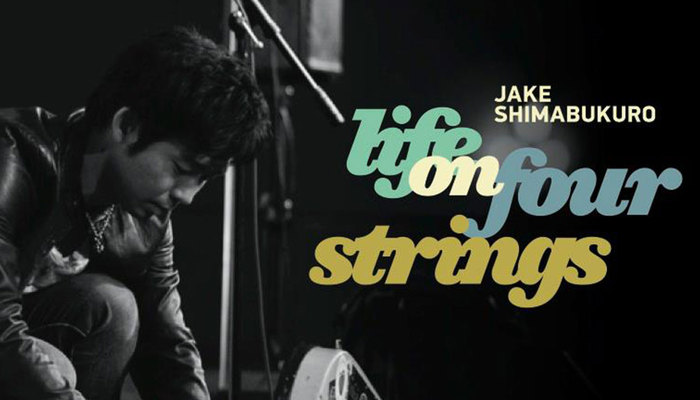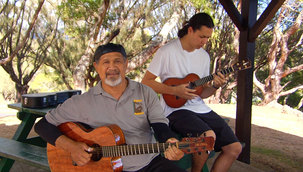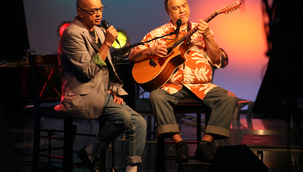
Jake Shimabukuro: Life on Four Strings
A compelling portrait of an inspiring and inventive musician whose virtuoso skills on the ukulele have transformed all previous notions of the instrument’s potential.
- Filmmaker(s)
- Tadashi Nakamura
- Category
- Full-Length Film
- Currently On-Air
- Subject Matter
- Arts & Music
“Music communicates the purest form of human emotion.”
— Jake Shimabukuro
Jake Shimabukuro: Life on Four Strings is a compelling portrait of an inspiring and inventive musician whose virtuoso skills on the ukulele have transformed all previous notions of the instrument’s potential. Through intimate conversations with Shimabukuro (pronounced she-ma-BOO-koo-row), Life on Four Strings reveals the cultural and personal influences that have shaped the man and the musician. On the road from Los Angeles to New York to Japan, the film captures the solitary life on tour: the exhilaration of performance, the wonder of newfound fame, the loneliness of separation from home and family.
A 30-something, fourth-generation Japanese American, Shimabukuro was born and raised in Honolulu, the child of parents who both loved music. Shimabukuro’s mother, Carol, played the ukulele and began to teach him at age four, as soon as his fingers were big enough to reach the chords. “The first time she put it in my hands I was just mesmerized by the sound of the instrument,” he says. “Every time I played the ukulele or heard it I felt so at peace. It just brought me home.” At age 13, when his parents divorced, Shimabukuro found solace in music, retreating to his room for hours. “I just played — it wasn’t practice — I just played,” he recalls.
In those early years, Shimabukuro was interested in playing everything as fast as he could, changing the sound with distortion pedals and amplifiers. But, over time, he came to believe that trying to make the ukulele into something else was disrespectful. He decided that if he were going to manipulate the sound of the instrument he would do it with his hands. “Once I committed to that path, the way that I approached music changed,” he says. “It wasn’t just about trying to play as fast as I could anymore. It was about letting the instrument breathe. That was when I really started to learn how to utilize space in my music.”
While on tour in New York, Shimabukuro revisits the site in Central Park where a video was made of his soulful rendition of “While My Guitar Gently Weeps.” Uploaded unbeknownst to him, it became one of the first YouTube videos ever to go viral. His career exploded.
In addition to Shimabukuro’s performances at concerts before sold-out crowds — where incredibly one man and one small instrument can hold huge audiences spellbound — the film captures his appearances at schools, providing glimpses of a man at ease with himself and happy to introduce children to the joy of music.
A few months after the devastating tsunami, Shimabukuro accompanies his longtime manager Kasuza Flanagan to her hometown — Sendai, Japan — the epicenter of the tragedy. The healing power of music is made palpably visible as he begins to play for the residents of a shelter. Wrinkled faces soften, eyes close in memory of a long-forgotten tune, toes tap out rhythm — even smiles break through.
Back home on O'ahu, Shimabukuro is surrounded by friends and family. Now married to obstetrician Kelly Yamasato and expecting their first child, Shimabukuro ponders his past — and a future he knows is sure to change (May 2013).
Available until May 2017 through PBS NPS
TADASHI NAKAMURA - DIRECTOR AND EDITOR
A few short years ago, Los Angeles-based filmmaker Tadashi Nakamura was named one of CNN’s “Young People Who Rock” for being the youngest filmmaker at the 2008 Sundance Film Festival, as well as one of the “30 Most Influential Asian Americans Under 30” by the popular website Angry Asian Man. Life on Four Strings is the 32-year-old, fourth-generation Japanese American’s first full-length documentary.
Nakamura’s trilogy of documentary films on the Japanese-American experience, Yellow Brotherhood (2003), Pilgrimage (2007) and A Song for Ourselves (2009) have garnered more than 20 awards at film festivals around the world, with Pilgrimage being one of 83 short films out of 7,500 submissions selected for the 2008 Sundance Film Festival. Film scholar B. Ruby Rich remarked, “Nakamura takes the joy of activism and makes it downright contagious!”
Director and Editor
Tadashi Nakamura
Executive Producers
Stephen Gong
Ruth Bolan
Producer
Donald Young
Senior Consulting Producer
Spencer Nakasako
Directors of Photography
Jim Choi
Na'alehu Anthony
Location Sound
Adriano Bravo
A production of Center for Asian American Media and Pacific Islanders in Communications in association with Paliku Documentary Films






